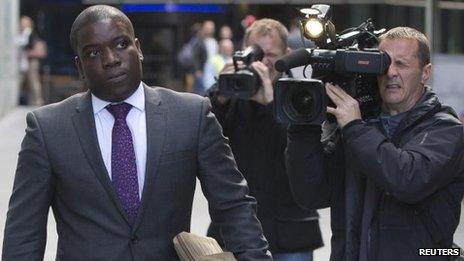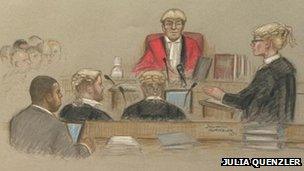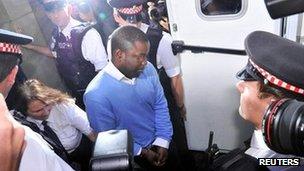Kweku Adoboli: From 'rising star' to rogue trader
- Published

Adoboli was accused of gambling more than £1bn of UBS funds in what the prosecution said was a bid to boost his own position within the firm
He was a promising young trader, born in Ghana and educated in Britain, a rising star in the UK investment banking arm of Swiss bank UBS. But former trader Kweku Adoboli will now forever be synonymous with one of the biggest trading losses in financial history after gambling away £1.4bn ($2.2bn) of his employer's money on unauthorised trades.
In what the prosecution branded a "bombshell" email in September 2011, 32-year-old equities trader Kweku Adoboli came clean about his off-the-book activities to UBS internal accountant William Steward.
He wrote: "I have now left the office for the sake of discretion. I will need to come back in to discuss the positions and explain face to face, but for reasons that are obvious, I did not think it wise to stay on the desk this afternoon."
His actions cost fellow traders their jobs, prompted the resignation of the chief executive and wiped £2.7bn ($4.5bn) from the UBS share price.
"We were told you wouldn't know where the limit of the boundary was until you got a slap on the back of the wrist," he said. "We found the edge, we fell off and I got arrested."
Adoboli claimed in court he had "lost control" of his trades under pressure from his bosses to generate bigger profits by taking greater risks.
But the prosecution said he had been motivated by greed and a desire for recognition among his peers.
After a trial at Southwark Crown Court, Adoboli was found guilty of two charges of fraud relating to unauthorised trading but was cleared of four counts of false accounting.
'Natural leader'
Adoboli had a privileged upbringing.
The son of a UN official, he travelled to Israel, Syria and Iraq, external and boarded at Ackworth, a prestigious public school in West Yorkshire where he was a successful head boy.
The head teacher at the time, Martin Dickinson, described Adoboli as an "outstanding student", who "was able academically, was a good sportsman and was a natural leader who was widely respected by students and staff".
He went on to study at Nottingham University and during his 2002 summer break completed an internship within the operations department at UBS.
After graduating from university in 2003, he was taken back as a trainee and moved quickly through the ranks.
Starting as an analyst in the administrative "back office" of the investment arm, it took him just two years to gain promotion to trader.

Prosecutors painted Adoboli as someone who consciously manipulated the books
But his time behind the scenes is central to Adoboli's story. It was while working in operations that he learned to alter financial records and master the processes that allowed him to cover his tracks.
During this time, Adoboli's £30,000 a year starting wage rose to £33,000 plus a bonus of £7,500.
In 2006, he became a trader on the exchange traded funds (ETF) desk, dealing with bundles of shares grouped together into a fund, which was then bought and sold.
He was part of a close-knit trading quartet his defence dubbed "the four musketeers".
Adoboli rented a £1,000-a-week loft apartment in Shoreditch, a fashionable area of east London close to the UBS office.
His former landlord Philip Octave described Adoboli as a "nice guy", adding: "I don't have a bad word to say about him."
By 2008 he was an associate director and in 2010 was promoted to director. By now he was earning nearly £200,000 including bonuses.
'Umbrella' fund
Adoboli started using the bank's money to place unauthorised trades - essentially bets - on stock markets in November 2008.
The prosecution told the court that, using the skills he learnt during his time in the UBS back office, Adoboli entered false information into UBS's computer systems to conceal the enormous risks he was taking.
In many cases he extended the time in which some trades would complete to buy him time to make up any losses.
He failed to insure or "hedge" these transactions, a ploy to maximise profits which exposes the bank to greater risk.
Adoboli also set up what he called his "umbrella", a slush fund he could use to hide any profits on his unauthorised trades.
By 2011, Adoboli was earning a combined salary and bonus of £360,000, more than 10 times his 2003 starting wage.
Despite the pressure, he had kept up the outward appearance of a "nice guy". Mr Hughes told the court Adoboli was referred to as "the good cop of the ETF team" by a colleague.
But by the summer of 2011, the strain was beginning to show.
'Not winning'
A junior trader on the desk, Christophe Bertrand, said Adoboli was "unfriendly, emphatic, unpleasant, distant [and] superior".
Adoboli split from his girlfriend for two weeks but reunited with her before his arrest.
As well as gambling the bank's money, Adoboli also traded on a personal level through two spread betting accounts held with IG Index and City Index Limited.
He lost about £123,000 ($200,000) trading with his IG account, and made £18,700 ($32,200) on his City Index investments.
The court heard how his current account was more than £3,500 overdrawn and that he had used pay-day loan companies such as Moneybox and Wonga.

Adoboli was arrested after he emailed his UBS bosses confessing to booking false trades
Fears about Adoboli's dealings surfaced in summer 2011 and an internal investigation, headed by UBS accountant William Steward, was launched.
Mr Steward probed his trades and asked difficult questions and ultimately Adoboli had no choice but to come clean.
He emailed Mr Steward on 14 September 2011 and appeared to confess to booking false trades.
The banker said it had been his girlfriend who had given him the strength to admit what he had done, saying, "You can't keep fighting this battle that you are clearly not winning."
The aftermath of Adoboli's loss proved turbulent for UBS. Chief executive Oswald Gruebel and the co-heads of global equities, Francois Gouws and Yassine Bouhara, all resigned after their management roles were questioned.
It was also reported, while the trial was ongoing, that UBS planned to announce 10,000 job cuts worldwide, as the bank reduced its investment banking activities in a move away from less risky trading.
As Adoboli begins his seven-year sentence, it is likely his story has again fuelled public perception of the hubris of the trading floor.
- Published20 November 2012
- Published20 November 2012